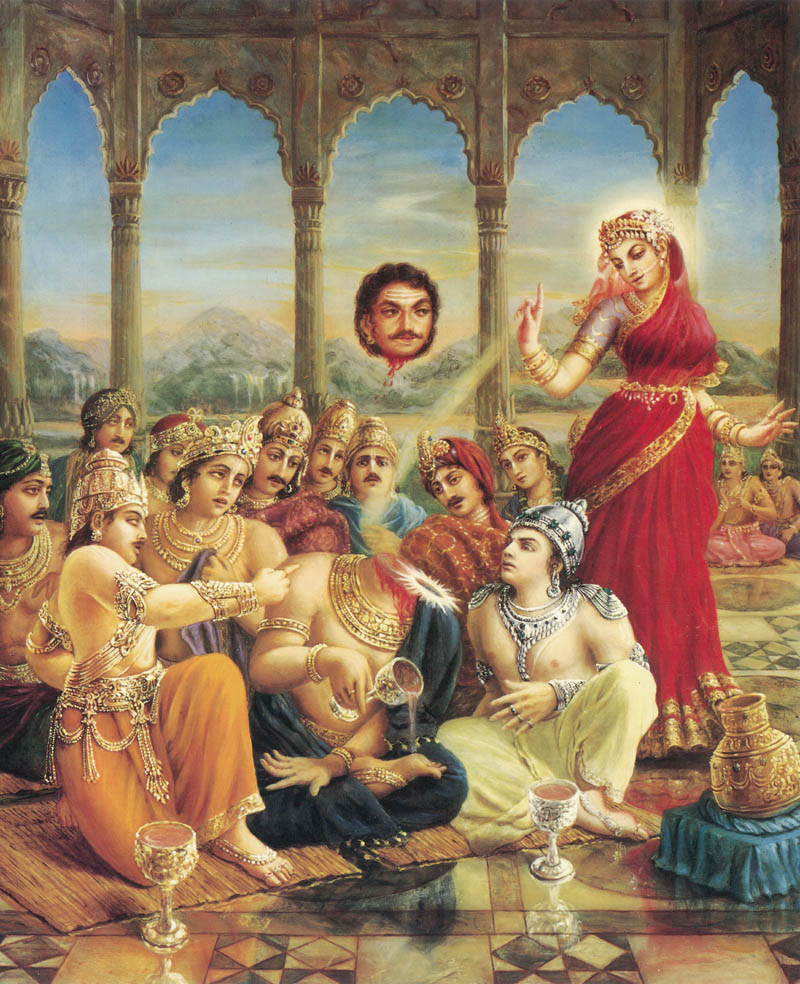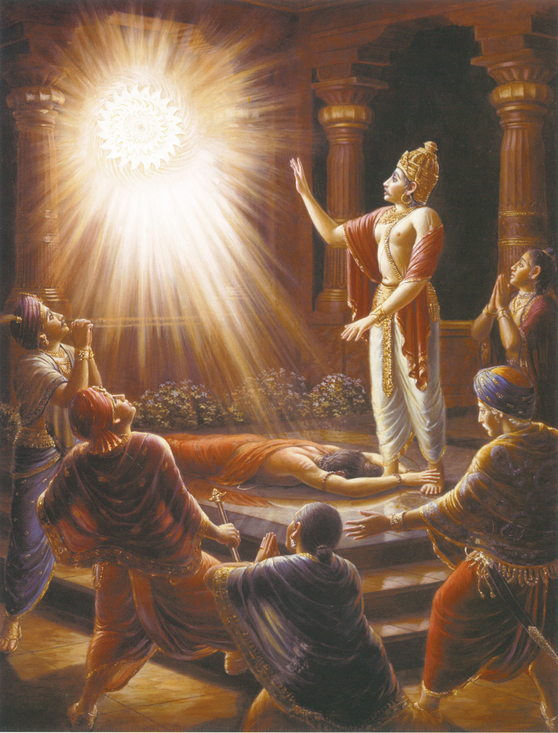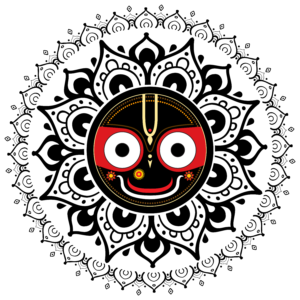(House of Bhakti) – It is not a day – it is Kṛṣṇa
The following is a transcription of a discourse delivered by Śrīla Bhaktivedānta Nārāyaṇa Mahārāja in Los Angeles, California, on June 5, 1998
Today is Ekādaśī, a very auspicious day. In this regard, let us remember the history of Ambarīṣa Mahārāja and Durvāsā Ṛṣi.* There are so many things to learn from this history – first to learn, then to practice, and then to realize.
What is the speciality of today that gives it the name Ekādaśī? It is the eleventh day from the dark moon day  (Amāvasyā) and from the full moon day (Pūrṇimā). We have eleven senses – five working senses and five knowledge-acquiring senses. That makes ten, and the mind is the eleventh. With these eleven senses we should try to become nearer to Kṛṣṇa. Ekādaśī – by our eleven senses we do ‘upavāsa’. Upa means ‘very near’ and vāsa means ‘to reside’. On the Ekādaśī day, we should try to be somehow nearer to Kṛṣṇa, with our entire mind and body, and with all our senses.
(Amāvasyā) and from the full moon day (Pūrṇimā). We have eleven senses – five working senses and five knowledge-acquiring senses. That makes ten, and the mind is the eleventh. With these eleven senses we should try to become nearer to Kṛṣṇa. Ekādaśī – by our eleven senses we do ‘upavāsa’. Upa means ‘very near’ and vāsa means ‘to reside’. On the Ekādaśī day, we should try to be somehow nearer to Kṛṣṇa, with our entire mind and body, and with all our senses.
Not following Ekādaśī will be harmful to us. On Ekādaśī the moon comes closer to the Earth, attracting water from everywhere – from the sea, the river, our bodies, and so on. If one takes any grains on this day, the grains become like blotting paper. If you drink water, the water will very soon pass out from the body. However, if you combine grains and water, the grains become like blotting paper or cotton – grains hold the water.
Even if you squeeze the cotton, some water will remain. Similarly, if you eat any grain, it becomes like a  sponge. It will hold a lot of water. The moon will attract that water, and all your diseases will increase. You can see this in the sea or ocean. There are high tides at this time, and the waves become very high.
sponge. It will hold a lot of water. The moon will attract that water, and all your diseases will increase. You can see this in the sea or ocean. There are high tides at this time, and the waves become very high.
Similarly, it is like this in our bodies. If a person already has some disease, his disease increases from Ekādaśī to Pūrṇimā and Ekādaśī to Amāvasyā. We have tested this in hospitals, and we see that of those who die in hospitals, most of them die on these days.
Control your eating on Ekādaśī, and do not eat grains. It is better to perform nirjala, complete fasting, without water. Today, in India, so many people observe nirjala Ekādaśī — even young boys — even when the temperature outside is 48 degrees Celsius. Still, these people observe nirjala. No harm comes to such persons by this; fasting removes all diseases.
Be careful to observe Ekādaśī in such a way that you will become nearer to Kṛṣṇa – to Kṛṣṇa and those personalities and things related to the Lord. This includes tulasī, Gaṅgā, Yamunā, Vṛndāvana, Girirāja, and any temple of Śrī Śrī Rādhā-Kṛṣṇa. Mostly it refers to His pure devotees – the rasika and tattva-jña uttama-adhikārīs (first-class pure devotees), and even to the madhyama-adhikārīs (intermediate devotees). If you are associating with them, living in Vṛndāvana, being near the tulasī plant, to Purī-dhāma where Śrī Caitanya Mahāprabhu resided for some time, to Śrī Govinda Temple and Śrī Gopīnātha Temple, and all temples, and if you are praying and hearing hari-kathā, you will become nearer to Kṛṣṇa. This is called upa (near) – vāsa (residing). Try not to do any worldly activities on Ekādaśī.
We should utilize at least one day in two weeks to be closer to Śrī Śrī Rādhā and Kṛṣṇa, and in that way you will not lose your bhakti. Their association will certainly increase your bhakti, so Kṛṣṇa has arranged this opportunity – He has become Ekādaśī. He invites us as Ekādaśī, “Today you should give your eleven senses to  Me.” This is a very good thing – Kṛṣṇa has become Ekādaśī – so we should try to observe it.
Me.” This is a very good thing – Kṛṣṇa has become Ekādaśī – so we should try to observe it.
Kṛṣṇa called His cakra and ordered him to go to Śiśupāla, and in one second that cakra cut off Śiśupāla’s head. In the Vedic scriptures, we see that whenever Kṛṣṇa takes His cakra and throws it, it immediately cuts off that person’s head. Why did the cakra pursue Durvāsā, who was quickly running away from it for one entire year, and still it did not reach him to cut his head? Why? What is the reason? Why was the cakra not cutting his head? It did not cut his head even after one minute, two minutes, three minutes, one hour, two hours, or even one month. It took nearly one entire year, but it still did not cut off his head. Why did it continue to remain two fingers away? What is the reason?
Devotee: Because Ambarīṣa Mahārāja was praying to Lord Viṣṇu for the benediction that nothing should harm Durvāsā.
Śrīla Bhaktivedānta Nārāyaṇa Mahārāja: No, this is not the reason. Ambarīṣa Mahārāja can never be opposed to Kṛṣṇa’s will. If Nārāyaṇa or Kṛṣṇa throws the Sudarśana cakra, it must cut off the person’s head.
Sudarśana cakra is not only a weapon. The word Sudarśana means ‘auspicious vision’. By connection with that auspicious vision, one will not die. He will not be destroyed, either by cutting of his head or by any other means.
Durvāsā Ṛṣi is a pure Vaiṣṇava; he is a manifestation of Śaṅkara, Lord Śiva. He is the greatest of all Vaiṣṇavas (‘vaiṣṇavānāṁ yathā śambhuḥ’)**. He wanted to glorify bhakti (pure devotion to Kṛṣṇa) and the power of the devotees of Kṛṣṇa in an indirect way. He can give any benediction to anyone, and he even gave a benediction to Śrīmatī Rādhikā. Rādhikā received from him the benediction that whatever She cooked would be sweeter than nectar, which is the special feature of Her cooking.
How is it possible for a person who wanted to glorify bhakti and Kṛṣṇa to be opposed to a person like Ambarīṣa Mahārāja? Durvāsā Ṛṣi is a high-class brāhmaṇa and a yogī, and he is immortal. He lives in Brahmaloka***, not on this Earth planet.
Mahārāja Ambarīṣa was always chanting Hare Kṛṣṇa Hare Kṛṣṇa, Govinda Dāmodara Mādhaveti, and other devotional hymns (kīrtanas). He was very simple. He used to personally perform many services, such as collecting flowers and making garlands for Kṛṣṇa in the form of the Deity. He gave his ministers the job of controlling and maintaining his kingdom. No one could realize that he was such a high-class devotee.
A devotee who is always purely chanting Hare Kṛṣṇa Hare Kṛṣṇa while doing his worldly job and maintaining his life is greater than any yogī or brahma-jñānī (one who has realized the impersonal feature of the Supreme Lord) like Durvāsā. He may not have attained his spiritual position, but he is still much higher than a brahma-jñānī.
Sudarśana cakra knew, “Durvāsā was also my devotee. He wants to glorify bhakti, the Lord’s devotee, and the  Supreme Lord himself. Since he will glorify them indirectly, I will also act indirectly. I will not cut his head, but I will pursue him. I will do this to create fear in all those who are against the Lord’s devotees.” They will understand that Sudarśana cakra always protects all devotees, like Prahlāda Mahārāja, Gajendra, and others.
Supreme Lord himself. Since he will glorify them indirectly, I will also act indirectly. I will not cut his head, but I will pursue him. I will do this to create fear in all those who are against the Lord’s devotees.” They will understand that Sudarśana cakra always protects all devotees, like Prahlāda Mahārāja, Gajendra, and others.
Ambarīṣa Mahārāja was thinking, “What shall I do? On the one hand, if I drink caraṇāmṛta (the water that has bathed the Deity of the Lord), then I will be neglecting that brāhmaṇa-yogī, but on the other hand, I must consider Ekādaśī. If I do not properly observe Ekādaśī (which includes concluding it by honouring the Lord’s prasādam at the proper time the next day), that means I am neglecting Ekādaśī. What is more harmful to disobey a brāhmaṇa or to disobey bhakti?”
He concluded, “I might disobey thousands upon thousands of brāhmaṇas like this brahma-jñānī-yogī, but I cannot disobey the holy name or Ekādaśī.”
The Vaiṣṇavas utter this prayer before honouring mahā-prasādam (the remnants of the Lord’s foodstuffs),
mahā-prasāde govinde
nāma-brahmaṇi vaiṣṇave
svalpa-puṇyavatāṁ rājan
viśvāso naiva jāyate
(From Skanda Purāṇa, quoted in Caitanya-caritāmṛta, Antya-līlā 16.96, Purport)
[“Persons who are not very highly elevated in pious activities cannot believe in the remnants of food [prasādam] of the Supreme Personality of Godhead, nor in Govinda, the holy name of the Lord, nor in the Vaiṣṇavas.”]
We cannot disobey harināma or Ekādaśī.
Ekādaśī is the mother of devotion. If you observe Ekādaśī, bhakti will surely come. It may seem very ordinary, but it is not ordinary at all. Mahārāja Ambarīṣa took some caraṇāmṛta, which was not pāraṇa (breaking the fast) and also pāraṇa at the same time because this water is not like a grain or food. When one observes nirjala Ekādaśī (fasting even from water), if one drinks water the next day at the specified time for breaking the fast, then that water is also considered pāraṇa. Otherwise, if one takes fruits and water on Ekādaśī, he will have to break the fast with a grain. Mahārāja Ambarīṣa was observing nirjala for three days. On the first day, he drank water one time; on the last day (Dvadāsī, the day after Ekādaśī) one time; and in between, for the entire Ekādaśī day, he did nirjala. He did not sleep at night, not even for a moment. Rather, he was always  chanting and remembering Śrī Kṛṣṇa’s name and glories. This is the process of Ekādaśī.
chanting and remembering Śrī Kṛṣṇa’s name and glories. This is the process of Ekādaśī.
We are not qualified like Mahārāja Ambarīṣa, so Kṛṣṇa has given us some concessions, and Śrīla Bhaktivedānta Svāmī Mahārāja has also given more concessions to us. You can take fruit, milk, and curd, there is no harm in that – but observe Ekādaśī. Don’t take grains. Try to have one meal a day. Still, if you are not able, you can take two times, but not three times, four times, five times, six times – with one kilo of juice, rabarī (an Indian sweet), one kilo of mango, fruit juice, orange juice, and after that apple juice – not giving a rest to your stomach, but always eating. We should not do this. One or two meals are sufficient; each time, one should take only enough prasādam to half-fill the stomach. Half the stomach should remain empty. Take very little; then it is Ekādaśī.
* Mahārāja Ambarīṣa was the emperor of the entire world, but he considered his opulence temporary. Indeed, knowing that such material opulence is the cause of downfall into conditional life, he was unattached to this opulence. He engaged his senses and mind in the service of the Lord. This process is called yukta-vairāgya, or feasible renunciation, which is quite suitable for worship of the Supreme Personality of Godhead. Because Mahārāja Ambarīṣa, as the emperor, was immensely opulent, he performed devotional service with great opulence, and therefore, despite his wealth, he had no attachment to his wife, children or kingdom. He constantly engaged his senses and mind in the service of the Lord. Therefore, to say nothing of enjoying material opulence, he never desired even liberation.
Once Mahārāja Ambarīṣa was worshipping the Supreme Personality of Godhead in Vṛndāvana, observing the vow of Dvādaśī. On Dvādaśī, the day after Ekādaśī, when he was about to break his Ekādaśī fast, the great mystic yogī Durvāsā appeared in his house and became his guest. King Ambarīṣa respectfully received Durvāsā Muni, and Durvāsā Muni, after accepting his invitation to eat there, went to bathe in the Yamunā River at noontime. Because he was absorbed in samādhi, he did not come back very soon. Mahārāja Ambarīṣa, however, upon seeing that the time to break the fast was passing, drank a little water, in accordance with the advice of learned brāhmaṇas, just to observe the formality of breaking the fast. By mystic power, Durvāsā Muni could understand that this had happened, and he was very angry. When he returned he began to chastise Mahārāja Ambarīṣa, but he was not satisfied, and finally he created from his hair a demon appearing like the fire of death. The Supreme Personality of Godhead, however, is always the protector of His devotee, and to protect Mahārāja Ambarīṣa, He sent His disc, the Sudarśana cakra, which immediately vanquished the fiery demon and then pursued Durvāsā, who was so envious of Mahārāja Ambarīṣa. Durvāsā fled to Brahmaloka, Śivaloka and all the other higher planets, but he could not protect himself from the wrath of the Sudarśana cakra. Finally he went to the spiritual world and surrendered to Lord Nārāyaṇa, but Lord Nārāyaṇa could not excuse a person who had offended a Vaiṣṇava. To be excused from such an offense, one must submit to the Vaiṣṇava whom he has offended. There is no other way to be excused. Thus Lord Nārāyaṇa advised Durvāsā to return to Mahārāja Ambarīṣa and beg his pardon.
(Śrīmad-Bhāgavatam, Canto 9, Chapter 4, Summary)
By the order of the Supreme Personality of Godhead, Viṣṇu, Durvāsā Muni immediately went to Mahārāja  Ambarīṣa and fell at his lotus feet. Mahārāja Ambarīṣa, being naturally very humble and meek, felt shy and ashamed because Durvāsā Muni had fallen at his feet, and thus he began to offer prayers to the Sudarśana cakra just to save Durvāsā. What is this Sudarśana cakra? The Sudarśana cakra is the glance of the Supreme Personality of Godhead by which He creates the entire material world. Sa aikṣata, sa asṛjata. This is the Vedic version. The Sudarśana cakra, which is the origin of creation and is most dear to the Lord, has thousands of spokes. This Sudarśana cakra is the killer of the prowess of all other weapons, the killer of darkness, and the manifester of the prowess of devotional service; it is the means of establishing religious principles, and it is the killer of all irreligious activities. Without his mercy, the universe cannot be maintained, and therefore the Sudarśana cakra is employed by the Supreme Personality of Godhead. When Mahārāja Ambarīṣa thus prayed that the Sudarśana cakra be merciful, the Sudarśana cakra, being appeased, refrained from killing Durvāsā Muni, who thus achieved the Sudarśana cakra’s mercy. Durvāsā Muni thus learned to give up the nasty idea of considering a Vaiṣṇava an ordinary person (vaiṣṇave jāti-buddhi). Mahārāja Ambarīṣa belonged to the kṣatriya group, and therefore Durvāsā Muni considered him lower than the brāhmaṇas and wanted to exercise brahminical power against him. By this incident, everyone should learn how to stop mischievous ideas of neglecting Vaiṣṇavas. After this incident, Mahārāja Ambarīṣa gave Durvāsā Muni sumptuous food to eat, and then the King, who had been standing in the same place for one year without eating anything, also took prasāda. Mahārāja Ambarīṣa later divided his property among his sons and went to the bank of the Mānasa-sarovara to execute devotional meditation.
Ambarīṣa and fell at his lotus feet. Mahārāja Ambarīṣa, being naturally very humble and meek, felt shy and ashamed because Durvāsā Muni had fallen at his feet, and thus he began to offer prayers to the Sudarśana cakra just to save Durvāsā. What is this Sudarśana cakra? The Sudarśana cakra is the glance of the Supreme Personality of Godhead by which He creates the entire material world. Sa aikṣata, sa asṛjata. This is the Vedic version. The Sudarśana cakra, which is the origin of creation and is most dear to the Lord, has thousands of spokes. This Sudarśana cakra is the killer of the prowess of all other weapons, the killer of darkness, and the manifester of the prowess of devotional service; it is the means of establishing religious principles, and it is the killer of all irreligious activities. Without his mercy, the universe cannot be maintained, and therefore the Sudarśana cakra is employed by the Supreme Personality of Godhead. When Mahārāja Ambarīṣa thus prayed that the Sudarśana cakra be merciful, the Sudarśana cakra, being appeased, refrained from killing Durvāsā Muni, who thus achieved the Sudarśana cakra’s mercy. Durvāsā Muni thus learned to give up the nasty idea of considering a Vaiṣṇava an ordinary person (vaiṣṇave jāti-buddhi). Mahārāja Ambarīṣa belonged to the kṣatriya group, and therefore Durvāsā Muni considered him lower than the brāhmaṇas and wanted to exercise brahminical power against him. By this incident, everyone should learn how to stop mischievous ideas of neglecting Vaiṣṇavas. After this incident, Mahārāja Ambarīṣa gave Durvāsā Muni sumptuous food to eat, and then the King, who had been standing in the same place for one year without eating anything, also took prasāda. Mahārāja Ambarīṣa later divided his property among his sons and went to the bank of the Mānasa-sarovara to execute devotional meditation.
(Śrīmad-Bhāgavatam, Canto 9, Chapter 5, Summary)
**
nimna-gānāṁ yathā gaṅgā
devānām acyuto yathā
vaiṣṇavānāṁ yathā śambhuḥ
purāṇānām idam tathā
Śrīmad-Bhāgavatam, 12.13.16
[Just as the Gaṅgā is the greatest of all rivers, Lord Acyuta the supreme among deities and Lord Śambhu [Śiva] the greatest of Vaiṣṇavas, so Śrīmad-Bhāgavatam is the greatest of all Purāṇas.]
*** Śrī Śukadeva Gosvāmī continued: Thus being satisfied in all respects, the great mystic yogī Durvāsā took permission and left, continuously glorifying the King. Through the skyways, he went to Brahmaloka, which is devoid of agnostics and dry philosophical speculators.
Although Durvāsā Muni went back to Brahmaloka through the spaceways, he did not need an airplane, for great mystic yogīs can transport themselves from any planet to any other without any machine. There is a planet named Siddhaloka whose inhabitants can go to any other planet because they naturally have all the perfection of yoga practice. Thus Durvāsā Muni, the great mystic yogī, could go through the skyways to any planet, even to Brahmaloka. In Brahmaloka, everyone is self-realized, and thus there is no need of philosophical speculation to come to the conclusion of the Absolute Truth. Durvāsā Muni’s purpose in going to Brahmaloka was apparently to speak to the residents of Brahmaloka about how powerful a devotee is and how a devotee can surpass every living entity within this material world. The so-called jñānīs and yogīs cannot compare to a devotee.
(Śrīmad-Bhāgavatam 9.5.22, Purport)
Source: Purebhakti.com
Image(s) made possible by Pixabay.com, Krishnapath.org and/or Bhaktiart.net
Unless indicated differently, all verse translations and quotes are from the books by Śrīla Prabhupāda (Vedabase.com)
[ad_2]
#day #Kṛṣṇa






